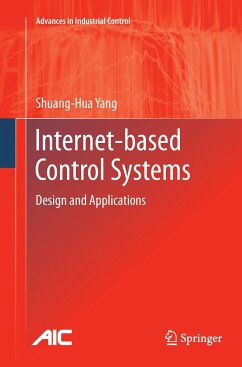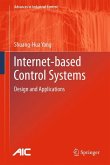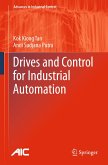The Internet plays a significant and growing role in real-time industrial manufacturing, scheduling and management. A considerable research effort has led to the development of new technologies that make it possible to use the Internet for supervision and control of industrial processes.
Internet-based Control Systems addresses the challenges that need to be overcome before the Internet can be beneficially used not only for monitoring of but also remote control industrial plants. New design issues such as requirement specification, architecture selection and user-interface design are dealt with. Irregular data transmission and data loss and, in extreme cases, whole-system instability may result from Internet time-delay; this book guards against such phenomena from both computer science and control engineering perspectives. Security breaches and safety risks in an Internet-based control system could have very serious consequences and the author gives specific advice foravoiding them. This book is unique in bringing together multiple strands of research, mainly from computer science and control engineering, into an over-arching study of the entire subject.
Practical perspectives are explored both through case studies in several chapters and through real applications including:
· robot arm control;
· web-based simulator for a catalytic reactor;
· virtual supervision parameter control of a water tank system;
· model predictive control for a process control unit;
· remote control performance monitoring and maintenance;
· remote control system design and implementation;
Internet-based Control Systems is a useful introduction and guide for researchers in control engineering and computer science and developers of real-time Internet-enabling software. It can also be used for teaching a final year option or elective on Internet-enabled real-time system design, or as an advanced example of real-time software design for graduates.
Internet-based Control Systems addresses the challenges that need to be overcome before the Internet can be beneficially used not only for monitoring of but also remote control industrial plants. New design issues such as requirement specification, architecture selection and user-interface design are dealt with. Irregular data transmission and data loss and, in extreme cases, whole-system instability may result from Internet time-delay; this book guards against such phenomena from both computer science and control engineering perspectives. Security breaches and safety risks in an Internet-based control system could have very serious consequences and the author gives specific advice foravoiding them. This book is unique in bringing together multiple strands of research, mainly from computer science and control engineering, into an over-arching study of the entire subject.
Practical perspectives are explored both through case studies in several chapters and through real applications including:
· robot arm control;
· web-based simulator for a catalytic reactor;
· virtual supervision parameter control of a water tank system;
· model predictive control for a process control unit;
· remote control performance monitoring and maintenance;
· remote control system design and implementation;
Internet-based Control Systems is a useful introduction and guide for researchers in control engineering and computer science and developers of real-time Internet-enabling software. It can also be used for teaching a final year option or elective on Internet-enabled real-time system design, or as an advanced example of real-time software design for graduates.
From the reviews:
"The book deals with the characteristics of Internet communication from a control theory perspective, and discusses control architecture, procedures and implementations. ... The book aims mainly at engineers (by involving several case studies and experimental setups to vindicate its design proposals), but also at computer scientists in general, as it develops on a conceptual level the ideas of an Internet based control architecture and also hints at practical programming level implementations ... with a view to security and performance across hetereogeneous systems in the Internet." (Manuel Bremer, Zentralblatt MATH, Vol. 1225, 2012)
"The book deals with the characteristics of Internet communication from a control theory perspective, and discusses control architecture, procedures and implementations. ... The book aims mainly at engineers (by involving several case studies and experimental setups to vindicate its design proposals), but also at computer scientists in general, as it develops on a conceptual level the ideas of an Internet based control architecture and also hints at practical programming level implementations ... with a view to security and performance across hetereogeneous systems in the Internet." (Manuel Bremer, Zentralblatt MATH, Vol. 1225, 2012)









